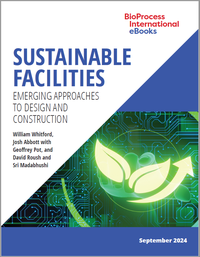eBook: Sustainable Facilities — Emerging Approaches to Design and ConstructioneBook: Sustainable Facilities — Emerging Approaches to Design and Construction
Sponsored by Astrea Bioseparations

Biopharmaceutical companies continue to forge ahead with initiatives to improve environmental sustainability in their operations. Some companies are implementing campaigns to reduce carbon emissions. Other organizations are investigating “green” chemistries, both for processes and for the raw materials and consumables underlying them. And corporate leaders often are working to effect broad changes in their company cultures, encouraging employees to make sustainability a constitutive part of their work in drug development and manufacturing. But clear opportunities remain for establishing environmentally sustainable biomanufacturing facilities. This BPI eBook highlights recent advancements and successes in the realm of bioproduction facilities.
First, BPI editorial advisor William Whitford describes the introduction of artificial intelligence/machine learning (AI/ML) into building information management (BIM) solutions. Such tools are already facilitating information-sharing and communication among architects, facility engineers, contractors, and other stakeholders during facility design and construction. But as Whitford explains, AI/ML approaches are gaining utility for multidimensional modeling that could help to predict the environmental impacts of facility parameters and supply-chain strategies. The resulting models could help biopharmaceutical companies to design a new generation of environmentally sustainable sites.
Next, BioProcess Insider editor Josh Abbott reflects on his 2023 conversation with Geoffrey Pot, the general/site manager of Takeda SA’s facility in Lessines, Belgium. Last year, that site won the ISPE Facility of the Year (FoYA) category award for social impact. Abbott and Pot explore Takeda’s efforts to meet ambitious goals for reducing net carbon emissions and to optimize facility water and electricity consumption. Pot also emphasizes the need for industry collaboration to establish truly sustainable biomanufacturing facilities.
David Roush and Sri Madabhushi conclude the eBook with a preview of their article for the November–December 2024 issue of BPI, demonstrating the value of considering sustainability during bioprocess conceptualization rather than later stages of process development and manufacturing. Applying sustainability assessment early is critical, they argue, because decisions made about processes and platforms during research and development (R&D) can have multiplicatively positive effects for sustainability once implemented for manufacturing.
Read the complete eBook now to discover how biomanufacturing facilities have become a locus for improving sustainability in the biopharmaceutical industry.
You May Also Like






